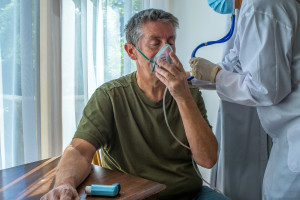Rescuers "on the precipice". Emotional exhaustion, depersonalization of patients

- Being on the front line of providing help to injured people, paramedics are often exposed to aggressive behaviour from patients, but also stress resulting from difficult interventions
- The consequence may be the phenomenon of professional burnout in the group of paramedics.
- - We decided to examine the level of this burnout, to see if this phenomenon actually occurs - says Dr. Monika Szkultecka-Dębek, vice president of the Qualitas Vitae Institute Foundation
- - The preliminary analysis based on the MBI questionnaire indicates that this study group is at risk of burnout - he emphasises
- Burnout is already observed individually, and it is only a step away from affecting the entire professional group.
In Poland, the estimated number of paramedics working in the profession (in pre-hospital care and in hospitals) is approximately 16,000, although some of them work outside the State Emergency Medical Services (PRM) system.
Being on the front line of providing assistance to injured people, they are often exposed to aggressive behavior from patients, but also stress resulting from difficult interventions. The consequence may be the phenomenon of professional burnout in the group of paramedics.
- We decided to examine the level of this burnout, whether this phenomenon actually occurs - said Dr. Monika Szkultecka-Dębek, vice president of the Qualitas Vitae Institute Foundation, during this year's Journal of Health Policy & Outcomes Research conference (JHPOR, April 25, 2025).
- The first stage was to assess whether paramedics as a professional group are at risk of burnout, and then to compare the results of the tests used in terms of consistency. We also examined the scale of positive attitude - described the expert.
The tools used are the LBQ and MBI tests. The LBQ (Link Burnout Questionnaire) analyses burnout in such aspects as the level of psychophysical exhaustion, commitment to work relationships, professional effectiveness and perceived disappointment with work.
MBI is a questionnaire based on Christina Maslach's burnout theory (Maslach Burnout Inventory). The tool consists of 22 test items that assess the frequency of certain feelings in respondents on a scale of 1 to 4 (very often, sometimes, rarely, never).
Each test item is assigned to one of three separate subscales: emotional exhaustion, depersonalization, and sense of personal accomplishment.
Finally, the results are calculated. In the subscales: emotional exhaustion and depersonalization, the higher the results, the more intense the level of burnout. In the subscale of personal achievement, the lower the result, the higher the burnout index.
The survey was conducted during a multi-day conference for paramedics in October 2024. The questions were answered by 150 people, 76 percent of whom indicated that they currently work as paramedics.
The average time of work in the current place in years was almost 10 years. Most of the respondents had higher education, the median age of the respondents was 35. Almost 70 percent of the respondents declaring that they work as paramedics are men.
Emotional exhaustion, depersonalization of patientsIn the emotional exhaustion subscale, one of the questions was: "when I get up in the morning, I feel tired already, when I see a new day of work ahead of me." Sixty percent of respondents indicated answers indicating a high level of emotional exhaustion.
When asked "I don't really care what happens to some customers," more than 60 percent of respondents also indicated responses that indicated a high level of emotional exhaustion.
In the second subscale: depersonalization, to the statement: "I have the impression that I treat some clients as if they were objects", the responses of almost 75 percent of respondents indicated a high level of depersonalization.
- Another example of a sentence from this subscale: "I have become more indifferent to people since I started doing this job." In this case, the response rate of 45 percent indicates a medium level of depersonalization, explained Dr. Monika Szkultecka-Dębek.
The third part of the survey was to provide an answer about the sense of personal achievement. Almost 40 percent of respondents identified with the statement: "I am afraid that my job makes me compassionate," which indicates an average level of personal achievement. It is similar in the case of the statement: "I feel that through my job I have a positive impact on life."
- Initial analysis based on the MBI questionnaire indicates that this group of respondents is at risk of burnout. All responses in the emotional exhaustion subscale remain at a similar level of 60-75 percent. This indicates a high level of emotional exhaustion - assessed the expert.
- In turn, the results in the depersonalization subscale are not as clear-cut. There is a greater dispersion of answers between 45-75 percent, which indicates certain discrepancies between respondents. They may result from differences in age, gender or job seniority. The results in the sense of personal achievement subscale remain at an average level - she described.
As Dr. Szkultecka-Dębek emphasized, it cannot yet be clearly stated that paramedics as a professional group are definitely burnt out at this point:
- Certainly, however, if nothing changes, if they work in the same conditions as they do now, if no one takes care of their mental condition, then the group of paramedics is definitely on the brink of such an abyss. Professional burnout is already observed individually, and this is only a step away from affecting the entire professional group.
Copyrighted material - reprint rules are specified in the regulations .
rynekzdrowia












